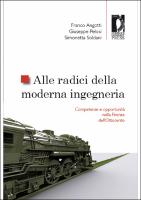Alle radici della moderna ingegneria
Competenze e opportunità nella Firenze dell'Ottocento
Contributor(s)
Angotti, Franco (editor)
Soldani, Simonetta (editor)
PELOSI, GIUSEPPE (editor)
Language
ItalianAbstract
The subject around which the contributions in this volume gravitate is the creation of a higher institute of engineering studies in Florence in the late nineteenth-century. On the eve of the unification of Italy, Florence was a promising centre for a Polytechnic, in view of the experience of the Corpo di Ingegneri di Acque e Strade, the precocious railway building, the importance of the mining sector and the solidity of the Istituto Tecnico Toscano. Despite this, unlike what took place in Milan and in Turin, the Istituto Tecnico Toscano was not transformed into a Polytechnic for the training of engineers. The reasons for this non-development can be traced to the lack of "industrialist" propensities in the managerial group that emerged victorious from the "peaceful revolution" of 1859, to a desire for independence from the national academic system built on the Casati law, and to a local demand for engineering skills that was less dynamic than expected. Consequently, the prevailing winds were those of "normalisation" blowing from the government, the universities and the most prestigious Colleges of Engineers. Nevertheless, Florence continued to represent an important technological centre, especially in relation to railway infrastructures, public works, and the mechanical engineering industries (for example Pignone and Galileo). In the end it was not until one hundred years after unification that the city finally became the seat of a Faculty of Engineering.


 Download
Download Web Shop
Web Shop